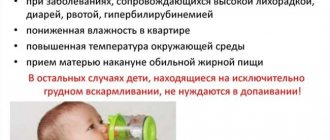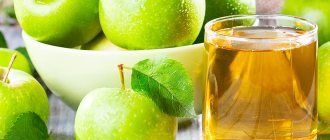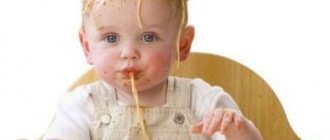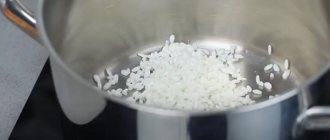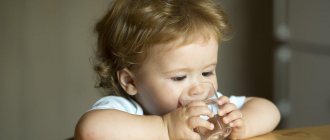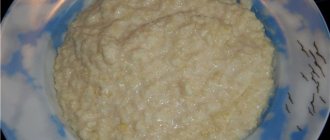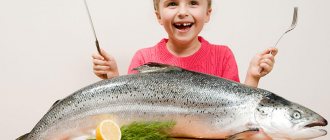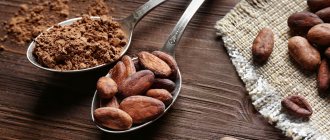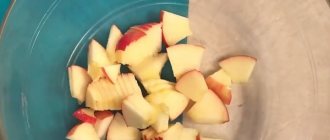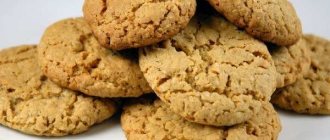How and when can you start giving children water?
The best way to give water to your baby (6 months and older) is to have him drink from a cup with a sippy cup (aka sippy cup). Don't force your child to drink if he refuses. With the introduction of complementary foods, the baby will need more fluid. Therefore, start giving your baby a little water at the moment when he begins to get acquainted with solid food. Don't rush, your child will need to get used to the fresh taste of water. When you give your baby water, you are also developing a healthy habit. It is not recommended to give your child juice, as this may develop a craving for sugary drinks, which can subsequently lead to obesity.
What kind of water do we give to babies?
Drinking water contains many salts and various elements. The child's body, in the first year of life, has not yet matured. The child is not able to absorb minerals in large quantities. Therefore, for feeding babies up to one year old, we recommend choosing special bottled water for baby food. It has the following features:
- balanced chemical composition;
- the alkalinity level, which is as close as possible to the alkalinity level of human blood, is within 7.45;
- moderately mineralized, children in the first year of life require mineral saturation in the range of 200-400 mg/l;
- does not require boiling;
- does not contain substances harmful to the child’s body;
- suitable not only for drinking, but also for cooking;
- not treated with silver or carbon before bottling.
Children's bottled water undergoes strict quality control. It is safe for babies.
Can the mixture be diluted with water?
Infant formula in powder form can be diluted with water. Be sure to follow the manufacturer's recommendations and add strictly the specified amount of water.
Too much water in the finished mixture is dangerous. Adding excess water to formula or supplementing with formula feeding can lead to water intoxication.
If you dilute the mixture with water in a larger volume than the manufacturer recommends, the amount of nutrients your baby receives will decrease. This can lead to underweight, developmental delays, electrolyte imbalances and, in extreme cases, seizures.
Therefore, carefully read the directions on the package and follow these rules for feeding your baby formula.
What water is suitable for infants
The digestive system of a newborn baby is highly sensitive to any change in diet, including the introduction of water. Everything that enters the baby’s body must be of high quality and be absolutely safe. Therefore, it is necessary to determine what kind of water should be given to the newborn. This is how many useful elements water that meets all standards should include in an amount of 1 liter:
- microelements - from 200 mg;
- calcium - up to 60 mg;
- magnesium - from 10 to 35 mg;
- sodium - up to 20 mg;
- potassium - 5-20 mg.
Ordinary boiled tap water does not meet these requirements: it is too hard, contains a certain amount of harmful foreign impurities, and also loses all its beneficial properties during the boiling process.
It can only be used with a child filter made of environmentally friendly plastic. Purified water should be stored in a glass container or plastic bottle marked “7”.
Neither mineral nor carbonated water is suitable for infants to drink. Distilled and deionized water can be given to a child no earlier than 3 years old.
The best option is specially prepared bottled water for babies, which contains everything necessary in the right proportions, is clean and does not require boiling, is soft and pleasant to the taste. You can buy it in pharmacies, and after opening the bottle it should be stored in the refrigerator for no more than a day.
Do you need to boil tap water?
Information about the quality and safety of water in your place of residence must be clarified with the relevant organizations. Also, most likely, your pediatrician will be able to tell you whether it is okay to give your baby boiled running water. You can also use bottled water if the quality of your tap water is poor. How to prepare boiled water?
- Bring the water to a boil and let it simmer for 1 minute.
- Remove from heat and let cool to room temperature (about 30 minutes).
Before giving water to your baby, check its temperature by dropping a drop on your wrist.
How much water to give to a bottle-fed newborn?
The formulas that are recommended for feeding a child differ in their composition. That is why in this case it is recommended to adhere to a special regime.
The baby is fed with formula every 4 hours. It is recommended to offer water to your baby several hours after feeding.
There are a number of specific situations in which a child must be offered water.
Drinking water will prevent dehydration
When the body temperature rises, the child sweats quite often, which leads to loss of moisture from the body. Dehydration can severely damage internal organs. When a pathological condition appears, it is recommended to give the newborn water every 5 minutes.
Dehydration is quite common with diarrhea. It is necessary to give water to the child while he is awake. Water is given to a newborn from a syringe or teaspoon.
If a child is in conditions of elevated temperature, he must also be given water. Room humidity should be between 40 and 50 percent. The temperature should not exceed 22 degrees.
During the period of introducing complementary foods, most pediatricians advise giving children water. Otherwise, due to lack of fluid, young patients may experience constipation.
When bottle-fed, babies should only be given boiled water. It is recommended to boil it over a fire for 5 minutes.
After this, it should cool down to 25 degrees. If mixed feeding is carried out in the first months of a baby’s life, then the water temperature should be from 26 to 30 degrees. It is recommended to gradually reduce the temperature.
For children 6 months of age, water at room temperature is recommended.
It is recommended that newborn babies be given water without fail after they reach one month of age. On average, a child should drink 30-70 milliliters of water per kilogram of body weight.
The amount of liquid consumed directly depends on the individual characteristics of the baby. The child himself will determine whether he needs to drink water or not. It should be given to parents regularly.
In the video - tips for caring for a child:
Noticed a mistake? Select it and press Ctrl+Enter to let us know.
How much water should a breastfed baby be given?
Studies have shown that breast milk can satisfy a child's needs for both food and drink, because... it is approximately 90% water. It is generally accepted that the first milk is thinner. And the “back”, which comes after 10-15 minutes of sucking, is the baby’s food, it is fattier and more nutritious.
If you have ever pumped, you have probably noticed that at first the milk flows quickly, it is almost transparent and has a bluish tint, reminiscent of “very diluted milk.” This is “foremilk”. Then it becomes more and more difficult to express and the milk comes out a different color, rich white or with a yellowish, creamy tint. This is precisely “hind milk”. From this we can conclude that for a healthy baby who receives only breast milk, water is not needed.
At what age can you give water to a child? As soon as the baby turns six months old, he begins to be introduced to complementary foods. This period is most suitable for starting to introduce water into the child’s diet. But, even with the start of complementary feeding, if you are still practicing breastfeeding and want to prolong it, you do not need to give your child a lot of water.
The most correct thing is to offer the baby a drink, but not to insist. If a child refuses water, it means he simply does not want to drink, because... He gets enough fluid from breast milk.
I started giving water to my daughters when complementary feeding began - at 6 months. After each meal she offered water, but they either refused to drink at all or drank very little. This didn’t upset me, because... We have not abolished breastfeeding with the introduction of complementary foods. And, for 6-9 months, despite supplementary feeding, I practically did not limit the number of breastfeedings.
Obviously, the daughters had enough fluid from breast milk, so they did not really need water. At about 9 months, I reduced the number of breastfeeding to 3 times a day (breastfeeding immediately upon waking, then before nap and at night). From that time on, both my daughters began to drink noticeably more water - they could drink 30-40 ml. after meal. Also, they drank water well after water procedures) This is understandable - they began to receive less breast milk and, accordingly, the need for liquid increased.
If you need numbers and want to know how much liquid a child needs, you can be guided by this formula - per 1 kg. weight required 50 ml. liquids per day (this includes not only water, but breast milk, formula, tea, compote, soup and other liquids).
So, how much water should you give your breastfed baby?
Here are the recommended consumption rates, namely, WATER for a child per day: 4-6 months. – 30-50 ml. 7 months – 1 year – 70-100 ml. 1-1.5 years – 100-150 ml. 1.5 – 3 years – 150-300 ml.
Of course, these are only recommendations and indicators may change depending on the child’s well-being, the characteristics of his feeding and the conditions of his environment (obviously, if the child is hot, he may drink more).
In fact, you can adhere to such a simple rule - if the child is healthy, there is no need to force him to drink - he will drink as much as he needs.
Should I give water to a dehydrated child?
A baby may be dehydrated if he has a high fever, vomiting, diarrhea, or for some other reason. Here are some signs you can use to understand that a child is dehydrated:
- dry mouth
- decreased number of wet diapers
- restless behavior
- drowsiness
- sunken fontanel
If you think your baby is dehydrated, do not give him water. The best fluid to stay hydrated is breast milk or formula. And first of all, contact your pediatrician. He will be able to recommend a rehydration solution, drops, vitamins or minerals in syrup form, or medications to restore fluid and electrolyte balance.
Is it necessary to supplement your child's drinking?
It is impossible to unequivocally answer the question of whether a baby needs additional water. The need for additional soldering is influenced by the following indicators:
- baby's age;
- type of feeding;
- health status;
- room temperature;
- air humidity.
Up to six months
A healthy baby in the first six months of life, who is fed only breast milk, does not need additional fluid. Mother's milk is a source of both food and water for him. It satisfies all the nutritional needs of the baby. In addition, it is 80% water.
Breast milk is rich in elements necessary for the baby's digestion. And in the ratio that the baby needs. That is, every mother’s milk consists of nutrients necessary for her child, for his digestive system. If you supplement your baby with water, the ratio of nutrients will go wrong. The risk of developing problems with the digestive system increases.
Mother's milk meets the specific needs of the baby. If he needs more fluid, he begins to demand the breast more often. The child's body receives mainly “foremilk”, enriched with liquid, which is synthesized at the beginning of feeding. At the end of feeding, “hind” milk, rich in nutrients, is produced. It is thick.
A healthy baby who is fed artificially or mixed must be supplemented with special baby water. Your doctor will tell you the amount and time of use. If the child refuses to take water, then there is no need to insist.
The need for additional feeding of a sick child is decided by the attending physician, based on the baby’s condition. Everything here is individual. Moreover, it does not matter what type of feeding the sick baby is on. Some breastfed infants may be advised to supplement with water. If a baby actively drinks water, parents should think about whether he or she is getting enough breast milk. Children use water to compensate for lack of nutrition.
After six months
When answering the question whether a baby needs to be given additional fluid in the second half of life, pediatricians give a positive answer. At six months the first feeding begins. At this time, water is considered a prerequisite, regardless of the type of main food. It ensures proper digestion and complete absorption of complementary foods.
How to make sure your baby is getting enough fluids
Some mothers give their baby more to drink out of ignorance than out of necessity, believing that the child is not getting enough fluid. In fact, if a child gains more than 600 g of weight in a month, and pees up to 12 times a day, then all the baby’s vital signs are normal, and there is no need to supplement the baby’s food. And even more so, if the mother feeds the newborn on demand, without waiting 3-4 hours, then the baby will suck as much milk as he needs. It is worth giving your baby water during illness and with the introduction of complementary foods. In this case, it is better to give water from a mug or a special sippy cup. In terms of time, it is better to feed a newborn about 10 minutes in advance. before the main meal, so the baby will get drunk and prepare the stomach for milk that is more difficult to digest.
Wet diaper test or counting the number of peees: 12 or more wet diapers - everything is fine!
Medical indications for supplementation
Until the baby is fully grown and strengthened, doubts will constantly torment the young mother. But there are cases when it is worth giving a newborn drink during breastfeeding for medical reasons. Main reasons:
- elevated temperature, colds, fever - additional fluid intake during this period will help reduce dry skin, restore the water-salt balance in the body and alleviate the general condition of the disease;
- diarrhea and vomiting remove fluid from the body, so additional drinking will help replenish it;
- constipation - excess fluid thins the stool, which helps with bowel movements;
- jaundice - if you give your baby a little extra food while breastfeeding, the disease goes away faster. So, particles of excess iron are eliminated from the baby’s body in the urine, and the symptoms of the disease go away;
- heavy sweating;
- high temperature, low air humidity - extreme heat outside is not a reason to drink more, the mother needs to drink plenty of fluids at this time, and the baby should be provided with comfortable conditions (shade, clothing appropriate to the thermal regime), and breastfeeding if possible. To prevent dehydration of the body, you should maintain the optimal temperature in the room where the child is - 20 degrees, humidity - no more than 70%, and during walks in the fresh air you can supplement with water;
- The doctor can give indications for additional drinking for a newborn in case of intestinal infection and disturbances in the functioning of the stomach. In this case, if the gastrointestinal tract is disrupted, you should follow the pediatrician’s instructions about how much and when to give water to the baby, give carminative medications for colic (store-bought or dill water);
- A few sips of warm liquid will help you cope with hiccups.
It is worth giving your baby extra water if there are clear signs of dehydration:
- heat;
- general malaise, dry lips, eyes;
- change in urine color to darker, too concentrated, and urination no more than 7 times a day;
- retraction of the fontanel.
In some cases, the consequences may be so severe that medical intervention and hospitalization are required.
